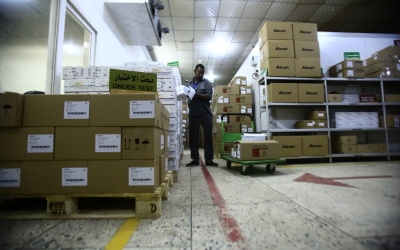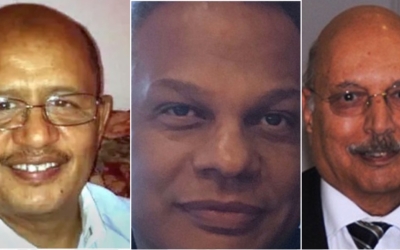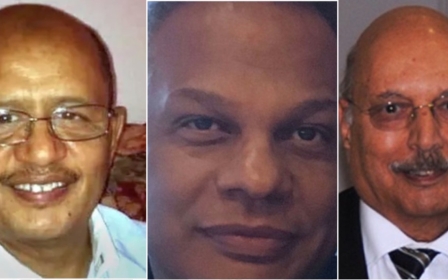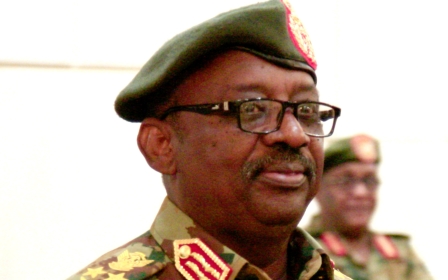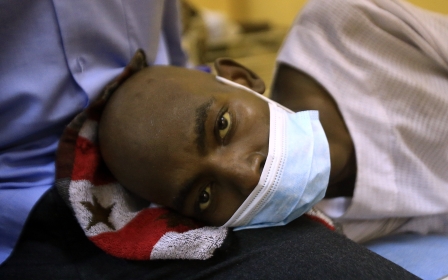Coronavirus: Sudan's doctors beaten by police after responding to pandemic
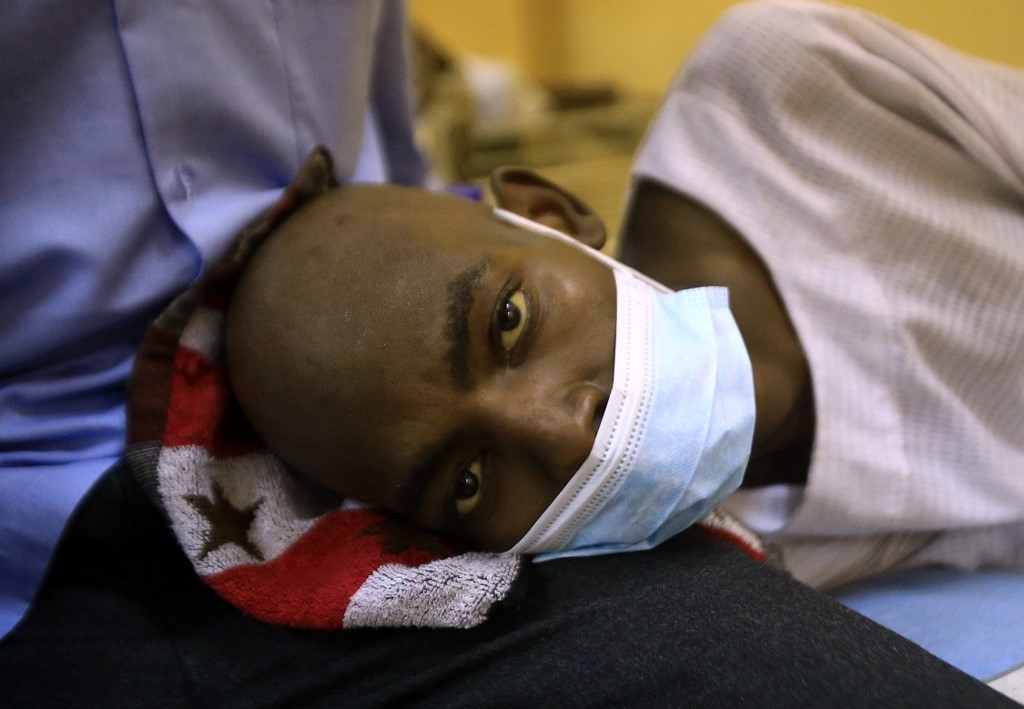
Just when Sudan needs its doctors the most, physicians battling the coronavirus across the country have found themselves under attack by policemen and have gone on strike in protest.
Hundreds more are threatening to join the action, as the threat of violence roils hospitals that fear cracking under the added strain after years of underinvestment.
There have only been 10 reported cases so far across the country, but with the virus being transmitted within the population, authorities fear worse is to come.
Medical staff complain that plain-clothed and uniformed policemen have repeatedly attacked doctors as they try to carry out their jobs.
The health ministry, however, is downplaying the issue and promising to draw up legislation to protect its workers.
Police have acknowledged the problem, but attributed the aggression to individual officers, stressing that its forces are disciplined and committed to dealing appropriately with civilians, including doctors. Yet attacks continue.
'Five men beat me until my nose bled'
Dr Mohammed Faisal told Middle East Eye that he was responding to an apparent coronavirus outbreak in the Jabal Awlia hospital in Khartoum's southern outskirts when five policemen, one of them uniformed and carrying a weapon, attacked him.
Faisal, 30, was trying to convince patients to evacuate the building after a suspected case of coronavirus was reported there and staff sought to contain the situation.
But some patients refused to cooperate and so he tried to call security.
"But one of the patients was an armed policeman and tried to use force to reject the measures," Faisal said.
"Suddenly five men beat me until my nose bled, and I was taken to the emergency room by my colleagues.
"We managed to get an investigation opened after many obstructions from the police at the station, but I don't think that they will be punished."
For Faisal, it was just the latest such incident; a drunk police officer had tried to stab him at the hospital six months earlier.
A reluctant strike
Ghofran Awad, Jabal Awlia hospital's medical director, said its entire team of doctors have now gone on strike and are refusing to deal with non-urgent cases.
According to Awad, the hospital serves thousands of people in Khartoum and White Nile state, and the strike will have serious repercussions.
"Sudan is full of different infections, it's not only about corona, so we won't stop treating the emergency and 'hot' cases. But the strike will affect the entire capacity of the hospital nonetheless," she said.
"These kinds of incidents have become common. That is very serious and should be stopped now, and the doctors should be protected, especially as the world is now looking for additional medical teams to face the spread of corona."
The Central Committee of the Sudanese Doctors, one of the syndicates that led the protests ending the rule of president Omar al-Bashir in April 2019, said attacks on medical teams by security forces and civilians had become a common phenomenon, especially in emergency units across the country.
The committee played a key role in last year's uprising, treating protesters and publishing the numbers of casualties, which the government had withheld.
Omer Ahmed Salih, the committee's secretary-general, told MEE that hundreds of doctors were now on strike because of such attacks.
Although the union sympathises with the physicians' strike, it is trying to convince them to keep working, as Sudan and countries across the world battle the coronavirus pandemic.
"Doctors in the Jabal Awlia, Turkish, Ahmed Gasm and Bahri hospitals, and others in Khartoum have faced similar incidents this month, as well as others outside Khartoum in the cities of Algezira, Elfasher, Atbara and Elobeid," Salih told MEE.
"We, however, called on the doctors not to strike, and we make this appeal to them again in these exceptional circumstances. But also the authorities have to take responsibility and protect the doctors."
Police denials
Only last week, the committee reported another doctor being detained overnight by police imposing a curfew who had stopped the doctor at a checkpoint, despite him trying to get to work.
Despite the apparent regularity of the attacks, police have denied any intentional aggression towards medical workers and insist the incidents are not systematic.
Captain Hamza Alnur, head of the police media office, described the incidents as isolated cases that being are investigated. The culprits are being punished, he said.
"We can't say that there are no cases of clashes between the doctors and citizens, and sometimes with regular forces, [but] the police are always committed and disciplined to intervene and protect the doctors and all citizens as well," he told MEE.
"Whenever any individual case happens, we are keen to protect the civilians, investigate the incident, and all those found guilty are held accountable and punished."
Meanwhile, the police were straining to increase their protection of medical facilities, he said, as well as making police hospitals available for the epidemic, enforcing curfews and keeping borders secure.
"We are working closely and in full cooperation with the other parties, including the health ministry, under the umbrella of the high committee of combating the spread of coronavirus," he said.
"We are committed to the security and medical instructions that come from the committee or the ministry."
Staff shortages
Even before the strikes, Sudan was suffering from a severe shortage of medical workers.
Another factor that has led to medical staff shortages is the health ministry's decision to stop the service of junior doctors who are carrying out their residency in hospitals after they graduate, Salih said.
The ministry said the current period does not count towards their training, which has left them unable to complete the process.
Salih said the decision has meant more than 1,000 medical professionals are out of service and 12 hospitals have had to shut down in recent days.
"The Ministry of Health has decided to suspend the service of the house officers, and that has kicked out at least 1,200 medical cadres from service in this exceptionally hard situation.
"Immediately after the decision, at least 12 hospitals have gone out of service as well and shut down in this difficult circumstances," he said.
'One doctor for every 10,000 patients'
Health minister Akram Ali Altoum declared in a statement last week that the training of house officer medical doctors had been suspended, but that the junior doctors would still have the right to volunteer to support the efforts of the health ministry in combating the spread of the coronavirus.
However, Abu Bakr Almagbul, head of the health ministry's epidemic department, told MEE that the decision had been revised by the Federal Ministry of Health.
"The decision was aimed at giving proper and full training for the junior doctors, but according to the current situation and the danger of losing the efforts of a lot of doctors in the current emergency, the minister has revised the decision," he said.
According to Salih, the country's healthcare system was badly mismanaged by the previous government, and the current administration has inherited poor infrastructure and severe staff shortages.
"There is a lack of everything in the Sudanese healthcare system, and the availability of medical teams is the worst area, as we have only about one doctor for every 10,000 patients, and this is a very low rate," he said.
"Sudan faces diseases that pose an even greater danger and probability of death than the coronavirus, so with the appearance of this pandemic we are really in a serious situation.
"We need every team, and to mobilise all our capacities and manage our limited resources very well, to pass this period safely."
This article is available in French on Middle East Eye French edition.
Middle East Eye propose une couverture et une analyse indépendantes et incomparables du Moyen-Orient, de l’Afrique du Nord et d’autres régions du monde. Pour en savoir plus sur la reprise de ce contenu et les frais qui s’appliquent, veuillez remplir ce formulaire [en anglais]. Pour en savoir plus sur MEE, cliquez ici [en anglais].


